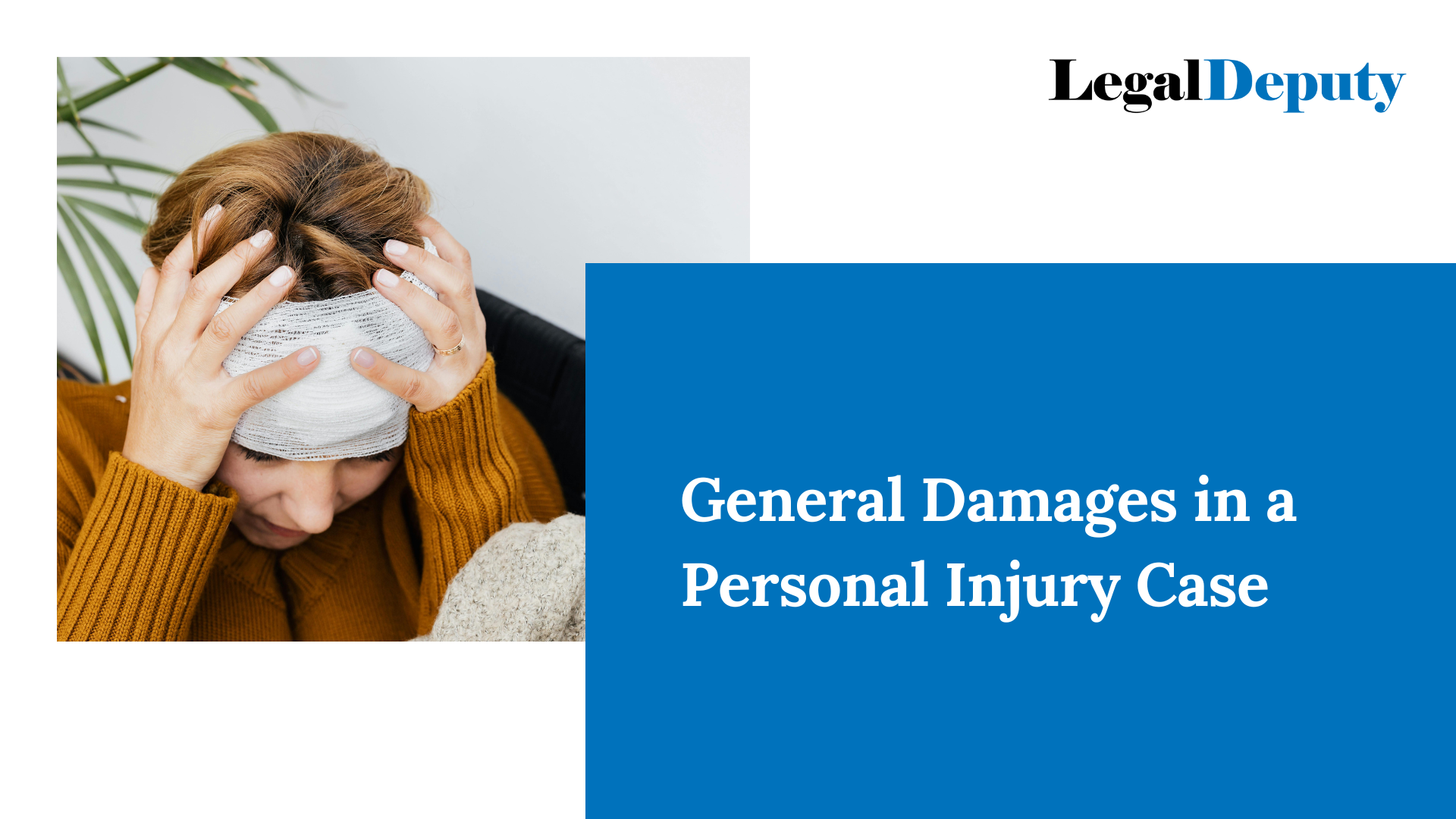What is General Damages in a Personal Injury Case?
When someone is injured due to another’s negligence or wrongdoing, they may file a personal injury claim to seek compensation. This compensation, often referred to as “damages,” can be divided into two primary categories: special damages and general damages.

In this blog, we’ll explore general damages in personal injury cases, what they cover, and how they’re calculated.
Understanding the Basics: General vs. Special Damages
Personal injury claims typically involve two types of compensation:
– Special Damages: These are economic losses that can be easily quantified, such as medical bills, lost wages, or property damage.
– General Damages: These are non-economic losses, covering the more subjective consequences of an injury, such as physical pain, emotional distress, and loss of enjoyment of life.
General damages address the intangible impacts of an injury, which can be more challenging to quantify but are just as critical to a victim’s recovery.
Want a Free Consultation?
Types of General Damages in Personal Injury Cases
General damages aim to compensate for the emotional and physical impact of the injury. The most common forms of general damages include:
– Pain and Suffering: This refers to the physical discomfort and emotional distress caused by the injury. It includes everything from chronic pain to the psychological trauma an individual experiences.
– Loss of Enjoyment of Life: If an injury prevents you from participating in activities you once enjoyed, this could be compensated. For instance, if a hobby or sports activity is no longer possible due to injury, general damages may be awarded for that loss.
– Emotional Distress: Beyond the physical pain, personal injuries often cause mental and emotional suffering, such as anxiety, depression, or post-traumatic stress disorder (PTSD).
– Disfigurement and Disability: Serious injuries may leave permanent scars or disabilities. These lasting impacts on a person’s appearance or physical abilities are considered general damages.
– Loss of Consortium: This compensates for the impact the injury has on your relationship with your spouse. For example, if the injury leads to loss of intimacy or companionship, this loss is included under general damages.
How Are General Damages Calculated?
Calculating general damages can be complex because they are subjective. Unlike special damages, which are tied to exact numbers like medical expenses, general damages rely on estimates. Courts or insurance companies use several methods to determine the amount.
– The Multiplier Method: One of the most common methods involves multiplying the total special damages by a certain number, known as the “multiplier.” The multiplier usually ranges from 1.5 to 5, depending on the severity of the injury. For example, if your medical bills (special damages) amount to $20,000 and the multiplier is 3, your general damages would be $60,000.
– The Per Diem Method: Another method assigns a specific dollar amount for each day you suffer due to the injury. This is often calculated based on how long the recovery process lasts, from the day of the injury until you reach maximum medical improvement.
Courts and insurance companies may also consider the severity of the injury, the victim’s age, and how the injury affects their future when calculating general damages. Here’s a guide on how much a typical injury settlement costs.
Factors Influencing General Damages
Several factors influence the amount of general damages awarded in personal injury cases:
– Severity of the Injury: More severe injuries that cause long-term or permanent damage generally result in higher general damages.
– Impact on Daily Life: If the injury significantly impacts your ability to work, perform daily tasks, or enjoy life, the compensation for general damages may increase.
– Credibility of Evidence: The strength of the evidence provided, including medical records, expert testimony, and witness statements, will impact the calculation. A well-documented case may lead to higher general damages.
– Jurisdiction: The location of your case can influence the potential compensation. Some jurisdictions may place limits (caps) on general damages, especially in medical malpractice cases.
Example of General Damages in a Personal Injury Case
To illustrate how general damages work, consider the following example:
Sarah is involved in a car accident due to another driver’s negligence. She suffers a fractured leg and emotional distress, requiring surgery and a long recovery period. Sarah also misses several months of work and can no longer participate in her favorite activities, such as jogging and dancing.
In Sarah’s case, her general damages may include compensation for:
- The physical pain from the injury and subsequent surgery.
- The emotional toll of dealing with a prolonged recovery and the trauma of the accident.
- The loss of enjoyment from being unable to participate in physical activities she once enjoyed.
- Any scarring or permanent disability resulting from the injury.
Sarah’s total compensation would include both special damages (medical bills, lost income) and general damages to cover her pain, suffering, and emotional distress.
The Role of Legal Representation in General Damages
Navigating a personal injury case can be complex, particularly when calculating general damages. Insurance companies may try to minimize payouts, making it essential to have strong legal representation. Personal injury lawyers can negotiate on your behalf to ensure fair compensation, especially when general damages are involved.
A qualified attorney can:
– Help gather the necessary evidence to support your claim.
– Work with medical experts to detail the full extent of your injuries.
– Negotiate with insurance companies to reach a fair settlement.
Want a Free Consultation?
While no amount of money can fully make up for the pain and emotional suffering caused by an injury, general damages play a crucial role in helping victims recover some sense of normalcy and move forward with their lives.
Frequently Asked Questions (FAQs)
Q1: Can I still claim general damages if my injury wasn’t severe?
Yes, general damages can be awarded for even minor injuries, as long as they cause pain, suffering, or emotional distress. The amount, however, will typically be lower for less severe injuries.
Q2: Is there a cap on general damages?
In some states or jurisdictions, there may be limits on the amount of general damages you can receive, particularly in medical malpractice cases.
Q3: How long does it take to settle a personal injury claim involving general damages?
The time frame varies. Simple cases may settle in months, while more complex cases involving extensive general damages can take a year or longer.
Conclusion
General damages are a key component of compensation in personal injury cases, addressing the non-economic losses victims endure. Whether you’ve experienced physical pain, emotional distress, or a loss of enjoyment in life, general damages aim to provide fair compensation for your suffering.
If you’ve been injured and are unsure about the compensation you may be entitled to, consulting a personal injury attorney can help clarify your options and ensure you receive the damages you deserve.
Disclaimer:
The information provided in this blog, “What is General Damages in a Personal Injury Case?”, is intended for general informational purposes only and does not constitute legal advice. While we strive to provide accurate and up-to-date information, the content of this blog may not reflect the most current legal developments or interpretations.
Readers should not act or refrain from acting based on the information contained herein without seeking appropriate legal or other professional advice on the specific facts and circumstances at issue from a licensed attorney in the relevant jurisdiction. This blog is not intended to create, and receipt of it does not constitute, an attorney-client relationship between the reader and the author or the author’s affiliated organization.
All liability with respect to actions taken or not taken based on the contents of this blog is expressly disclaimed. The information is provided “as is”; no representations are made that the content is error-free.
For specific legal advice regarding your personal injury case or any other legal matters, please consult with a qualified legal professional.







